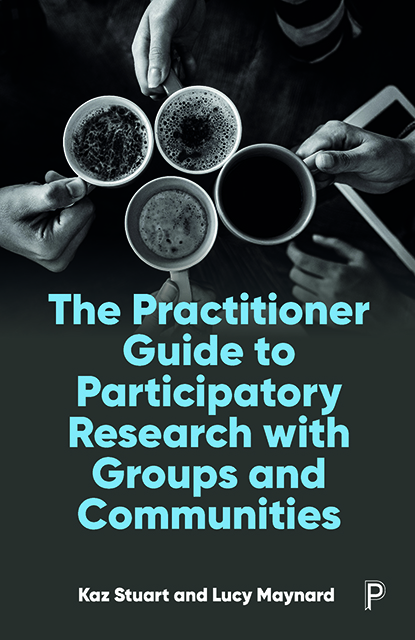Book contents
- Frontmatter
- Contents
- List of Figures and Tables
- Glossary
- About the Authors
- Acknowledgements
- Foreword
- Foreword
- Introduction
- 1 Just What is Participatory Research?
- 2 How do We Begin to Plan Our Participatory Research Project?
- 3 What Do We Want to Explore and Why?
- 4 What Ideas are the Foundations of Our Research?
- 5 How Will We go About Exploring Our Questions?
- 6 Who Can Get Involved to Explore Our Questions?
- 7 How Shall We Collect Our Data?
- 8 What Do We Do With Our Data?
- 9 How Do We Get Our Messages Out There?
- 10 How Do We Keep Everyone Safe?
- 11 Doing and Reviewing Participatory Research
- Conclusion
- References
- Index
8 - What Do We Do With Our Data?
Published online by Cambridge University Press: 21 June 2023
- Frontmatter
- Contents
- List of Figures and Tables
- Glossary
- About the Authors
- Acknowledgements
- Foreword
- Foreword
- Introduction
- 1 Just What is Participatory Research?
- 2 How do We Begin to Plan Our Participatory Research Project?
- 3 What Do We Want to Explore and Why?
- 4 What Ideas are the Foundations of Our Research?
- 5 How Will We go About Exploring Our Questions?
- 6 Who Can Get Involved to Explore Our Questions?
- 7 How Shall We Collect Our Data?
- 8 What Do We Do With Our Data?
- 9 How Do We Get Our Messages Out There?
- 10 How Do We Keep Everyone Safe?
- 11 Doing and Reviewing Participatory Research
- Conclusion
- References
- Index
Summary
Chapter overview
This chapter introduces data analysis. This can seem the most daunting part of research for some people but it doesn’t have to be. For this reason, this chapter will give a very straightforward overview of analysis to get you started on how to analyse the main types of data you are likely to have, namely numbers, words and images. We will also remind you of the socially just principles of participatory research, and thus participatory analysis, to keep our feet on the ground!
What is data analysis?
Data analysis simply means how you make sense of the data you have collected. This involves looking for patterns and trends in the information you have collected so that you can best summarise what it has to tell you – its story.
As human beings we are generally skilled at looking for patterns. As young children we used to collect and sort objects into groups of different sizes, shapes and colours. Looking at data uses just the same skills – finding commonality and difference in the data you have collected and sorting it into different groups.
Sorting through information and deciding whether things are the same or different might differ from person to person and study to study. Imagine you are sorting tea into different categories. One person might put all black teas into one group, all fruit teas into another and herbals into a third. Someone else might sort them by country of origin, or by soaking time. The way we approach analysis can therefore differ. We could have many different sets of analysis and findings from one set of data. It is therefore important to discuss different ideas for how to do the analysis and different views of what that analysis shows within the group of co-researchers.
It is best to approach analysis with curiosity and an open mind, to discuss differences and to be aware that you could tell many different ‘stories’ from the data. Working out which is the most important or most appropriate story to tell will be a key discussion.
- Type
- Chapter
- Information
- Publisher: Bristol University PressPrint publication year: 2022



